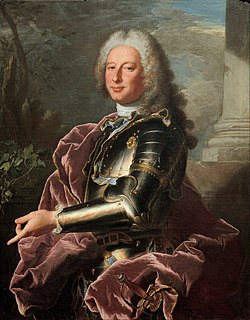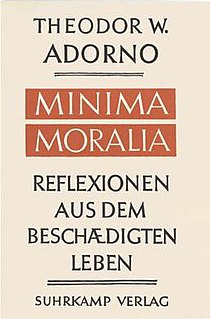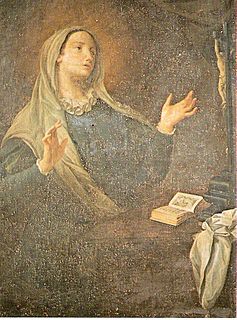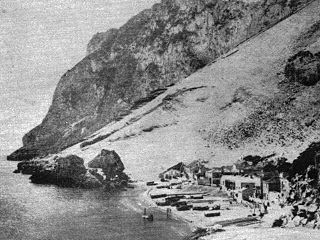
Max Horkheimer was a German philosopher and sociologist who was famous for his work in critical theory as a member of the 'Frankfurt School' of social research. Horkheimer addressed authoritarianism, militarism, economic disruption, environmental crisis, and the poverty of mass culture using the philosophy of history as a framework. This became the foundation of critical theory. His most important works include Eclipse of Reason (1947), Between Philosophy and Social Science (1930–1938) and, in collaboration with Theodor Adorno, Dialectic of Enlightenment (1947). Through the Frankfurt School, Horkheimer planned, supported and made other significant works possible.

Theodor W. Adorno was a German philosopher, sociologist, psychologist, musicologist, and composer known for his critical theory of society.

Igor Fyodorovich Stravinsky was a Russian composer, pianist, and conductor. He is widely considered one of the most important and influential composers of the 20th century.
When a person assumes the family name of their spouse, that name replaces the person's previous surname, which in the case of the wife is called the maiden name, whereas a married name is a family name or surname adopted by a person upon marriage. In Scotland it is legal and not unusual for a woman to retain her maiden name after marriage. In point of fact if a woman's family was more 'influential' than the groom then he sometimes took his bride's family name.
A surname, family name, or last name is the portion of a personal name that indicates a person's family. Depending on the culture, all members of a family unit may have identical surnames or there may be variations based on the cultural rules.

The Frankfurt School is a school of social theory and critical philosophy associated with the Institute for Social Research, at Goethe University Frankfurt. Founded in the Weimar Republic (1918–33), during the European interwar period (1918–39), the Frankfurt School comprised intellectuals, academics, and political dissidents who were ill-fitted to the contemporary socio-economic systems of the 1930s. The Frankfurt theorists proposed that social theory was inadequate for explaining the turbulent political factionalism and reactionary politics occurring in ostensibly liberal capitalist societies in the 20th century. Critical of capitalism and of Marxism–Leninism as philosophically inflexible systems of social organisation, the School's critical theory research indicated alternative paths to realising the social development of a society and a nation.

Simon Boccanegra is an opera with a prologue and three acts by Giuseppe Verdi to an Italian libretto by Francesco Maria Piave, based on the play Simón Bocanegra (1843) by Antonio García Gutiérrez, whose play El trovador had been the basis for Verdi's 1853 opera, Il trovatore.

The Doge of Genoa was the ruler of the Republic of Genoa, a communal republic, from 1339 until the state's extinction in 1797. Originally elected for life, after 1528 the Doges were elected for terms of two years. In actuality, the Republic was an oligarchy ruled by a small group of merchant families, from whom the doges were selected.
The term culture industry was coined by the critical theorists Theodor Adorno (1903–1969) and Max Horkheimer (1895–1973), and was presented as critical vocabulary in the chapter "The Culture Industry: Enlightenment as Mass Deception", of the book Dialectic of Enlightenment (1947), wherein they proposed that popular culture is akin to a factory producing standardized cultural goods—films, radio programmes, magazines, etc.—that are used to manipulate mass society into passivity. Consumption of the easy pleasures of popular culture, made available by the mass communications media, renders people docile and content, no matter how difficult their economic circumstances. The inherent danger of the culture industry is the cultivation of false psychological needs that can only be met and satisfied by the products of capitalism; thus Adorno and Horkheimer especially perceived mass-produced culture as dangerous to the more technically and intellectually difficult high arts. In contrast, true psychological needs are freedom, creativity, and genuine happiness, which refer to an earlier demarcation of human needs, established by Herbert Marcuse..
The Adorno family was a patrician family in Genoa, Italy, of the Ghibelline party, with the branches of Botta Adorno of Milan and Adorno Pastorino of Turin, several of whom were Doges of the republic. They were generally rivals of the Fregoso family. Both families rose to power in the late 14th century.

Minima Moralia: Reflections From Damaged Life is a 1951 book by the philosopher Theodor W. Adorno and a seminal text in critical theory. Adorno started writing it during World War II, in 1944, while he lived as an exile in America, and completed it in 1949. It was originally written for the fiftieth birthday of his friend and collaborator Max Horkheimer, who had co-authored the earlier book Dialectic of Enlightenment with Adorno.
Botta is a surname. People with this surname can be found in Brazil and in the southern Indian state of Andhra Pradesh. Notable people with the surname include:

Felipe Guaman Poma de Ayala, also known as Huamán Poma or Wamán Poma, was a Quechua nobleman known for chronicling and denouncing the ill treatment of the natives of the Andes by the Spanish after their conquest. Today, Guamán Poma is noted for his illustrated chronicle, Nueva corónica y buen gobierno.
A Portuguese name is typically composed of one or two given names, and a number of family names. The first additional names are usually the mother's family surname(s) and the father's family surname(s). For practicality, usually only the last surname is used in formal greetings.

Catherine of Genoa was an Italian Roman Catholic saint and mystic, admired for her work among the sick and the poor and remembered because of various writings describing both these actions and her mystical experiences. She was a member of the noble Fieschi family, and spent most of her life and her means serving the sick, especially during the plague which ravaged Genoa in 1497 and 1501. She died in that city in 1510.
The Clerics Regular Minor, commonly known as the Adorno Fathers, is a Roman Catholic religious order of priests and brothers founded by Saint Francis Caracciolo, Augustine Adorno, and Fabrizio Caracciolo in 1588 at Villa Santa Maria, Abruzzo. Belonging to the family of Clerics Regular, its members desired to sanctify themselves and the People of God by imitating in their lives the Paschal Mystery of Christ. Its motto is Ad Maiorem Dei Resurgentis Gloriam, "For the Greater Glory of the Risen God". The post-nominal letters are C.R.M.

Antoniotto Botta Adorno, also Anton Otto Marchese Botta d'Adorno was a high officer of the Habsburg Monarchy and a plenipotentiary of the Austrian Netherlands.
A name in the Italian language consists of a given name, and a surname ; in most contexts, the given name is written before the surname. (In official documents, the Western surname may be written before the given name or names.

A Genoese community has existed in Gibraltar since the 16th century and later became an important part of the population.
Antoniotto is a given name and a surname. Notable people with this name include the following:










